关于克隆的英语作文
克隆的好处 英文作文
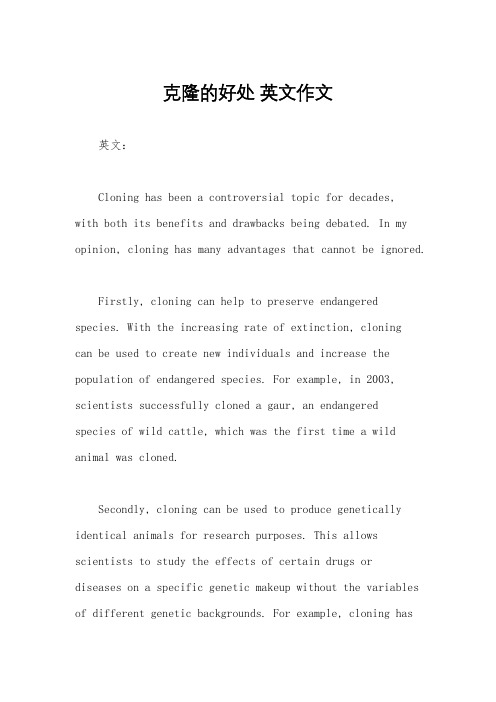
克隆的好处英文作文英文:Cloning has been a controversial topic for decades,with both its benefits and drawbacks being debated. In my opinion, cloning has many advantages that cannot be ignored.Firstly, cloning can help to preserve endangered species. With the increasing rate of extinction, cloningcan be used to create new individuals and increase the population of endangered species. For example, in 2003, scientists successfully cloned a gaur, an endangeredspecies of wild cattle, which was the first time a wild animal was cloned.Secondly, cloning can be used to produce genetically identical animals for research purposes. This allows scientists to study the effects of certain drugs ordiseases on a specific genetic makeup without the variables of different genetic backgrounds. For example, cloning hasbeen used to create mice with specific genetic mutationsfor studying diseases like cancer and diabetes.Lastly, cloning can also be used in the medical fieldto produce organs for transplant. With a shortage of organ donors, cloning can provide a solution by creating organs that are genetically identical to the recipient, reducing the risk of rejection.In conclusion, cloning has many potential benefits that cannot be ignored. While there are also ethical concerns surrounding cloning, the advantages it offers cannot be dismissed.中文:克隆技术是一个长期备受争议的话题,其优缺点一直在被辩论。
克隆的好处的英文作文
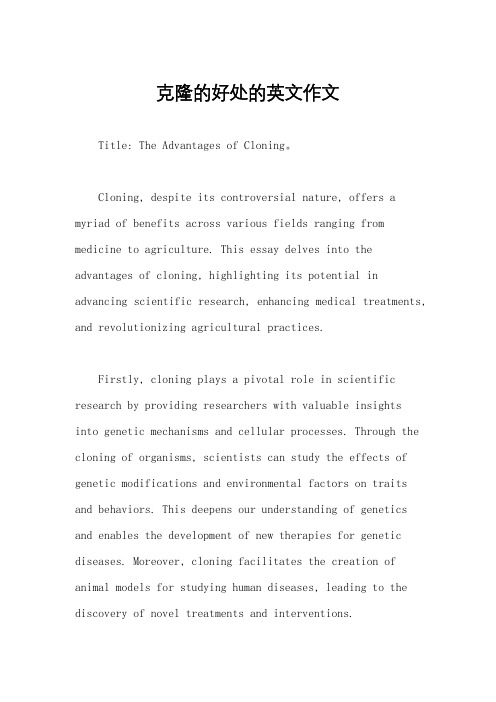
克隆的好处的英文作文Title: The Advantages of Cloning。
Cloning, despite its controversial nature, offers a myriad of benefits across various fields ranging from medicine to agriculture. This essay delves into the advantages of cloning, highlighting its potential in advancing scientific research, enhancing medical treatments, and revolutionizing agricultural practices.Firstly, cloning plays a pivotal role in scientific research by providing researchers with valuable insightsinto genetic mechanisms and cellular processes. Through the cloning of organisms, scientists can study the effects of genetic modifications and environmental factors on traits and behaviors. This deepens our understanding of genetics and enables the development of new therapies for genetic diseases. Moreover, cloning facilitates the creation of animal models for studying human diseases, leading to the discovery of novel treatments and interventions.In the realm of medicine, cloning holds immense promise for personalized healthcare and regenerative medicine. One of the notable advantages is the potential to generate patient-specific stem cells through therapeutic cloning. These stem cells can then be used to replace damaged tissues and organs, offering hope to individuals suffering from degenerative diseases or traumatic injuries. Furthermore, cloning enables the production of pharmaceuticals and vaccines in animal hosts, streamlining the manufacturing process and ensuring a stable supply of essential medical products.In agriculture, cloning offers opportunities to improve crop yields, enhance livestock breeding, and preserve endangered species. Agricultural cloning techniques can be utilized to propagate plants with desirable traits such as disease resistance, drought tolerance, and increased nutritional value. Similarly, cloning can accelerate the breeding of superior livestock by replicating elite individuals with favorable characteristics, thus boosting agricultural productivity and food security. Additionally,cloning serves as a valuable tool for conserving endangered species by preserving their genetic diversity andpreventing extinction.Furthermore, cloning contributes to advancements in biotechnology and industrial applications. It enables the production of genetically modified organisms (GMOs) with enhanced traits such as increased productivity, nutritional content, and resistance to pests and diseases. These genetically modified crops can address global challenges such as food scarcity, malnutrition, and environmental sustainability. Moreover, cloning facilitates the mass production of genetically identical organisms for research, commercial purposes, and bio-manufacturing, driving innovation and economic growth.Despite its undeniable benefits, cloning raises ethical, social, and regulatory concerns that warrant careful consideration. Ethical considerations include the moral status of cloned organisms, the welfare of animals involved in cloning procedures, and the potential misuse of cloning technology for unethical purposes. Moreover, societalattitudes towards cloning vary widely, ranging from acceptance to skepticism and opposition, reflecting diverse cultural, religious, and philosophical perspectives. Consequently, comprehensive regulations and ethical guidelines are essential to ensure responsible and ethical use of cloning technology while safeguarding human dignity, animal welfare, and environmental integrity.In conclusion, cloning offers a multitude of advantages across diverse domains, including scientific research, medicine, agriculture, and biotechnology. From advancing our understanding of genetics to revolutionizing medical treatments and agricultural practices, cloning holds immense potential to address pressing challenges and improve human well-being. However, it is imperative to approach cloning with caution, considering its ethical implications and societal concerns, and to implement appropriate regulations to govern its use responsibly. By harnessing the benefits of cloning while addressing its ethical and societal implications, we can unlock its full potential for the benefit of humanity and the environment.。
关于克隆好处与坏处的英语作文
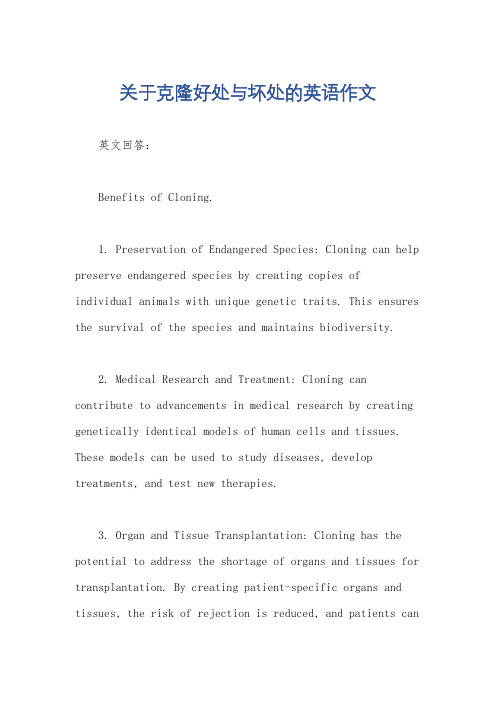
关于克隆好处与坏处的英语作文英文回答:Benefits of Cloning.1. Preservation of Endangered Species: Cloning can help preserve endangered species by creating copies ofindividual animals with unique genetic traits. This ensures the survival of the species and maintains biodiversity.2. Medical Research and Treatment: Cloning can contribute to advancements in medical research by creating genetically identical models of human cells and tissues. These models can be used to study diseases, develop treatments, and test new therapies.3. Organ and Tissue Transplantation: Cloning has the potential to address the shortage of organs and tissues for transplantation. By creating patient-specific organs and tissues, the risk of rejection is reduced, and patients canreceive life-saving treatments.4. Animal Husbandry and Agriculture: Cloning can improve animal breeding practices in agriculture. By creating clones of animals with desired traits, such as enhanced productivity, disease resistance, or growth rate, farmers can increase the efficiency and profitability of their operations.5. Genetic Engineering: Cloning techniques can be combined with genetic engineering to create animals with specific genetic modifications. This has applications in research, agriculture, and medicine, allowing scientists to create organisms with desirable traits or to study the effects of gene mutations.Drawbacks of Cloning.1. Ethical Concerns: Cloning raises ethical concerns about the creation of genetically identical individuals and the potential for human reproductive cloning. Ethical guidelines are necessary to ensure the responsible use ofcloning technology.2. Genetic Diversity: Cloning may reduce genetic diversity within a species, making them more susceptible to disease outbreaks or environmental changes. Genetic diversity is crucial for the survival and resilience of populations.3. Unforeseen Medical Consequences: The long-term health effects of cloning are not yet fully understood. Cloned animals may face health issues that are not evident in the original animal, raising concerns about their well-being.4. Cost and Accessibility: Cloning is a complex and expensive procedure, which may limit its accessibility for certain individuals or organizations. Equitable access to cloning technology is important to ensure its benefits are not concentrated among a few.5. Animal Welfare Concerns: Cloning involves procedures that may cause discomfort or distress to animals used inthe process. Ensuring the humane treatment of animals is essential when considering cloning.中文回答:克隆的优点。
克隆的英语作文
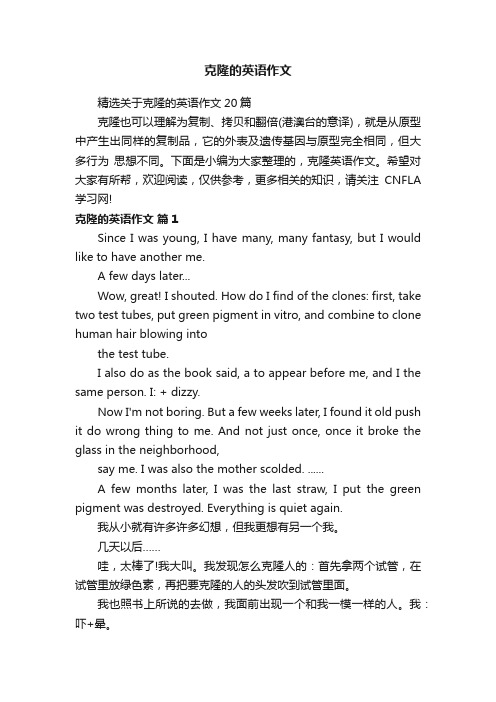
克隆的英语作文精选关于克隆的英语作文20篇克隆也可以理解为复制、拷贝和翻倍(港澳台的意译),就是从原型中产生出同样的复制品,它的外表及遗传基因与原型完全相同,但大多行为思想不同。
下面是小编为大家整理的,克隆英语作文。
希望对大家有所帮,欢迎阅读,仅供参考,更多相关的知识,请关注CNFLA 学习网!克隆的英语作文篇1Since I was young, I have many, many fantasy, but I would like to have another me.A few days later...Wow, great! I shouted. How do I find of the clones: first, take two test tubes, put green pigment in vitro, and combine to clone human hair blowing intothe test tube.I also do as the book said, a to appear before me, and I the same person. I: + dizzy.Now I'm not boring. But a few weeks later, I found it old push it do wrong thing to me. And not just once, once it broke the glass in the neighborhood,say me. I was also the mother scolded. ......A few months later, I was the last straw, I put the green pigment was destroyed. Everything is quiet again.我从小就有许多许多幻想,但我更想有另一个我。
克隆的好处英语作文

克隆的好处英语作文英文回答:Cloning has its advantages, especially in the field of medical research. One of the main benefits of cloning is that it allows scientists to create genetically identical animals for scientific study. This is particularly usefulin studying diseases and developing new treatments. Cloning also has the potential to help endangered species by creating new populations from a few individuals.Another advantage of cloning is that it can be used in agriculture to produce animals with desirable traits, such as increased milk production or resistance to disease. This can help farmers increase their yields and reduce the use of antibiotics and other drugs.However, cloning also has its drawbacks. One of the main concerns is that it can lead to a lack of genetic diversity, which can make populations more vulnerable todiseases and other problems. Cloning can also be expensive and time-consuming, which can limit its use in certain situations.Overall, cloning has its benefits and drawbacks, and it is up to scientists and policymakers to weigh these factors and decide when and how to use this technology.中文回答:克隆有其优点,特别是在医学研究领域。
有关克隆的英语作文
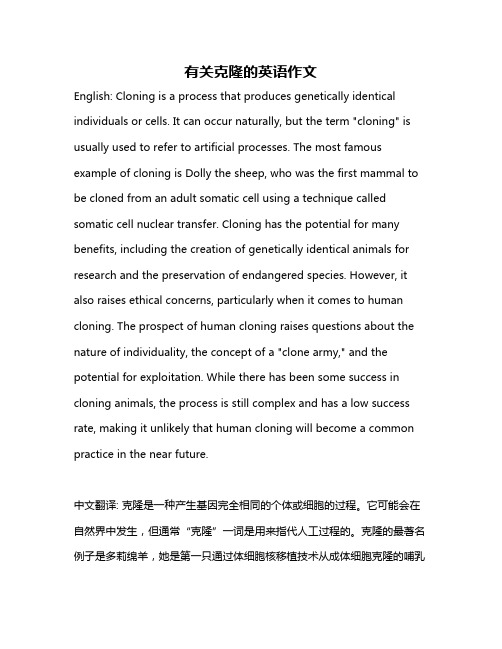
有关克隆的英语作文English: Cloning is a process that produces genetically identical individuals or cells. It can occur naturally, but the term "cloning" is usually used to refer to artificial processes. The most famous example of cloning is Dolly the sheep, who was the first mammal to be cloned from an adult somatic cell using a technique called somatic cell nuclear transfer. Cloning has the potential for many benefits, including the creation of genetically identical animals for research and the preservation of endangered species. However, it also raises ethical concerns, particularly when it comes to human cloning. The prospect of human cloning raises questions about the nature of individuality, the concept of a "clone army," and the potential for exploitation. While there has been some success in cloning animals, the process is still complex and has a low success rate, making it unlikely that human cloning will become a common practice in the near future.中文翻译: 克隆是一种产生基因完全相同的个体或细胞的过程。
关于克隆的英语作文
关于克隆的英语作文Essay 1: The Advantages and Disadvantages of CloningCloning is a controversial topic that has sparked significant debate in the scientific community and society as a whole. While some argue that cloning offers numerous benefits, others express concerns about its ethical implications.On the positive side, cloning has the potential to revolutionize the field of medicine. By cloning human organs, scientists can generate a source of compatible organs for transplantation, thereby solving the problem of organ shortages. Moreover, cloning could help in the production of pharmaceuticals and vaccines, making them more accessible to everyone.Additionally, cloning holds promise in agricultural science. It can be used to produce genetically modified crops that are resistant to pests and diseases, increasing food production and potentially addressing global hunger issues. Cloning is also used in animal husbandry to create superior livestock, resulting in increased efficiency in meat and dairy production.However, cloning also raises a host of ethical concerns. The most significant of these is the potential abuse of cloning technology, such as the cloning of humans. This raises questions about individuality, human rights, and the potential for creating "designer babies." Additionally, there are concerns about the physical and psychological health of cloned individuals and the impact it may have on their overall well-being.In conclusion, cloning brings both advantages and disadvantages to society. While it offers potential medical and agricultural benefits, we must also carefully consider the ethical implications and potential risks associated with cloning.Essay 2: The Ethical Dilemma of Cloning in Relation to Animal WelfareCloning is a topic that not only sparks ethical debates but also raises concerns about animal welfare. Cloning animals, although technically an impressive scientific achievement, forces us to question the moral implications of manipulating living beings for our own purposes.On one hand, supporters of animal cloning argue that it can be used to preserve endangered species and revive extinct ones. By cloning endangered animals, we can potentially restore their populations and prevent their extinction. Moreover, animal cloning can also be used for medical research purposes, leading to breakthroughs in the understanding and treatment of diseases. However, the ethical concerns surrounding animal cloning cannot be overlooked. Cloning involves extensive laboratory manipulation and often results in high failure rates and suffering for the animals involved. Cloned animals may exhibit various health problems and reduced lifespan, as seen in the case of Dolly the sheep, the world's first cloned animal. Additionally, cloning undermines the principles of natural selection and genetic diversity, which are essential for the survival and evolution of species.Furthermore, the economic aspect of animal cloning also raises questions about the prioritization of resources. Should we invest significant funds and resources into cloning animals when there are pressing issues such as animal rights, habitat conservation, and combating climate change that require our attention?In conclusion, the ethical dilemma of animal cloning demands careful consideration of the potential benefits and the ethical concerns it raises in terms of animal welfare and resource allocation.Essay 3: The Future of Cloning and its Impact on SocietyCloning has long been a topic of fascination and speculation in science fiction. However, recent advancements in cloning technology have brought us closer to a reality where human cloning could become a possibility. The implications of this potential breakthrough for society are vast and multifaceted.With the ability to clone humans, society would face a multitude of ethical and moral challenges. The idea of creating life in a laboratory raises questions about the sanctity of human life, individuality, and the very nature of what it means to be human. Additionally, concerns arise regarding the potential for cloning to be exploited for nefarious purposes, such as human trafficking or the creation of a controlled society.Furthermore, cloning could have profound social, economic, and psychological impacts. The socio-economic divide could widen as only the wealthy would have access to cloning technology,resulting in further inequality. The psychological well-being of cloned individuals may be negatively affected as they struggle with questions of identity and purpose. Additionally, the impact on family structures and relationships could be significant, as the distinction between biological and cloned children becomes blurred.However, despite the potential risks and concerns, cloning also holds promise for medical advancements and scientific breakthroughs. Cloned cells and tissues could revolutionize regenerative medicine, offering potential treatments for diseases and conditions that were previously untreatable. Additionally, cloning could provide a valuable resource for research, enabling scientists to study the intricate facets of human biology more comprehensively.In conclusion, the future of cloning and its impact on society is a complex and controversial topic. As we navigate the possibilities and challenges of this technology, it is crucial to ensure comprehensive discussions that weigh the potential benefits against the ethical and societal concerns that arise.。
克隆的英语作文(优秀4篇)
克隆的英语作文(优秀4篇)克隆英语作文篇一As we all know, the public has been debating whether cloning is a blessing or a curse. Scientists have made progress in cloning technology. They can reproduce a plete animal from one cell.Some people support cloning, saying that it can bring medical progress. Others are against cloning. Those who are in favor of this research believe that it will help the reproduction of endangered or even extinct species all over the world, which is morally wrong.Personally, I am in favor of cloning. On the one hand, we should strictly control it, on the other hand, we should spare no effort to strengthen the management of cloning technology. We should strictly prohibit human cloning.Only when we show great caution on this delicate issue can we benefit greatly from cloning.克隆英语作文篇二With the development of science and technology, our side appeared a lot of new things,such as clone,The scientific invention of clone has bee a hot topic among people,especially among the young and heated debates are right on their way.Now the cloning scientific has been used for many years to produce plants, it has brought us a lot of benefits but has created some serious problems as well. The benefit of cloning is cloning human organs or body parts , such as that if a parson in a traffic accident lost his arm or leg ,or someone get a serious heart disease and face danger ,he need a new body parts replace ,At this time we can use cloning technology copy a new parts of body to replace ,in the this way can be ensure that someone continue to live ,so that the clone is benefit for us . Everything has two sides and cloning is not an exception,it has both advantages and disadvantages. On the contrary,most people are against of cloning technology been used in our life, One of the biggest reason is that human cloning technology will break the gender balance,it will be bring up a great chaos. As far as I think cloning technology is more much disadvantage for human being ,we should very careful to use it, I believe that only in this way our life will be more beautiful克隆的作文篇三现在的地球到处都被污染了。
关于克隆的英语作文5篇
关于克隆的英语作文5篇关于克隆的英语作文篇一:CloningYou can read the word "cloning" quite often in the newspaper.I find it very interesting. It seems like a fairy story.With cloning you will be copied. Today, scientists can clone some large animals. Doctors are in the process of cloning humans though it is not allowed in most of the countries.Cloning brings a lot of questions. If someone can come to the world with only one parent, will he or she be happy? My grandmother died a few years ago. I miss her very much. If she can be cloned into a new one, I'll be very happy but confused.What shall I call her after she comes into the world? Because"she -- my grandmother" is younger than I.关于克隆的英语作文篇二:Westhusin’s experience with cloning animals leaves him upset by all this talk of human cloning. In three years of work on the Missy project, using hundreds upon hundreds of dog’s eggs, the A&M team has produced only a dozen or so embryos (胚胎) carrying Missy’s DNA. None have survived the transfer to a surrogate mother. The wastage of eggs and the many spontaneously aborted fetuses (胎) may be acceptable when you’re dealing with cats or bulls, he argues, but not with humans. "Cloning is incredibly inefficient, and also dangerous," he says.Even so, dog cloning is a commercial opportunity, with a nice research payoff. Ever since Dolly the sheep was cloned in 1997, Westhusin’s phone has been ringing with people calling in hopes of duplicating their cats and dogs, cattle and horses. "A lot of people want to clone pets, especially if the price is right,"says Westhusin. Cost is no obstacle for Missy’s mysterious billionaire owner; he’s put up $3.7 million so far to fund A&M’s research.Contrary to some media reports, Missy is not dead. The owner wants a twin to carry on Missy’s fine qualities after she does die. The prototype is, by all accounts, athletic, good-natured and supersmart. Missy’s master does not expect an exact copy of her. He knows her clone may not have her temperament. In a statement of purpose, Missy’s owner and the A&M team say they are "both looking forward to studying the ways that her clones differ from Missy."Besides cloning a great dog, the project may contribute insight into the old question of nature vs. nurture. It could also lead to the cloning of special rescue dogs and many endangered animals.However, Westhusin is cautious about his work. He knows that even if he gets a dog pregnant, the offspring, should they survive, will face the problems shown at birth by other cloned animals: abnormalities like immature lungs and heart and weight problems~ "Why would you ever want to clone humans," Westhusin asks, "when we’re not even close to getting it worked out in animals yet?关于克隆的英语作文篇三:CloningToday’s technology develops so quickly that many impossible things become true; the cloning technology is the example. What is cloning? Cloning is a process used to create an exact copy of a mammal by using the complete genetic material of a regular body cell. Different from the common propagate, cloning need only one cell and without sex. In 1997, the great news shocked the whole world that the British scientists createda lamp named Dolly from a single cell, miraculously; the cell had been taken from the udder of adult sheep, which show the first cloning experiment was successful.When the cloning technology improves so quickly, many scientists and doctors have different opinions, someone think it is good but someone think it is bad. Cloning can bring many benefits to the human, such as rejuvenation, helpful for Defective genes, Liver failure, Kidney failure and Leukemia. These disease are very different to cure, if we use the cloning technology we can change the Gene’s DNA order, so we can save lots of people. But cloning still has some problems. The scientists found that the cloning animal’s Gene has a little different from the original animal. So the life will shorter than the real life. The fact proved that, the cloning sheep Dolly has died. It only has the half life of the common sheep.In my own opinion I agree to clone the endangered animal and disagree with cloning human. Because I think the cloning technology should be respected. It really can bring us many benefits; further more it can develop the science of human. If clone the human, there will, however, be many problems, the population is the biggest problem. May be some people will use the cloning people to start the war. So I am against cloning human.Also many countries disagree to clone people. The government makes the laws about cloning. There are laws against human cloning in Canada, Denmark, England, Norway, Spain, and the UK. Even in the USA, the government doesn’t allow to clone human. (Because in USA, the human right is higher than everything)In the end, I think cloning is new technology, it should be accepted, how to look upon this technique, first we should knowthe advantages and disadvantages, then we should know the effect of cloning for human and the animal, third we will take the action: To advocate the animal cloning but be against with the human cloning.关于克隆的英语作文篇四:My View on CloneWith the repid development of technology, clone comes to the world. It can duplicate creature, which means it can make contribution to the production. People can pay a little and get a lot in the end. However, it also has disavantages. I think as the development of the high-tech, people can use clone to copy humen beings. It’s so horrible for me to know that there is someone the same with me. But in general, clone has more advantages than disadvantages.随着科技的迅速发展,克隆来到了这个世界。
关于克隆还是不克隆的英语作文80词
关于克隆还是不克隆的英语作文80词全文共6篇示例,供读者参考篇1To Clone or Not to Clone?Hi everyone! Today I want to talk about cloning. Cloning is a way to make an exact copy of something, like an animal or a plant. Some people think cloning is cool and can help us, while others think it's not a good idea.Let's start with the reasons why cloning is awesome! Cloning can help save endangered species. If there are only a few animals left in the world, we can clone them to make more. It's like making twins! Cloning can also be used to make medicines and treat diseases. Scientists can clone cells and use them to study how diseases work.But wait, there are also reasons why cloning might not be a good idea. Cloning can have risks and might not work perfectly. Sometimes cloned animals can have health problems. Imagine if we clone a pet and it gets sick. That would be really sad! Cloning can also make us forget about the importance of diversity. Everyliving thing is unique, and if we only have clones, it might not be good for nature.So, what's my opinion? Well, I think cloning can be useful, but we need to be careful. We should use cloning to help endangered species and find cures for diseases. But we should also remember that nature is amazing just the way it is. Let's appreciate the diversity of life!That's all for today, folks! Remember to think about the pros and cons of cloning before making up your mind. See you next time!Word Count: 169 words篇2Should We Clone or Not Clone? That is the Question!Hi there! My name is Jamie and I'm 10 years old. Today I want to talk about something really fascinating yet kind of scary – cloning! You've probably heard about cloning animals like Dolly the sheep, but did you know that scientists can also clone humans? It's true! But the big question is – should we do it or not? Let me share my thoughts.First off, what exactly is cloning? It's when you take the DNA from one living thing and use it to create an identical copy. So if you cloned me, you'd get another Jamie that looks exactly like me! Wild, right? Some people think cloning is awesome because it could help families who can't have babies naturally. If the parents provide the DNA, the clone would be their biological child. Pretty cool!But cloning also has some major downsides. For one, no one knows for sure if cloned humans would be 100% normal and healthy. The cloning process could potentially cause mutations or defects. Nobody wants a clone born with major health issues! Another scary thing is that cloning could be used for sinister purposes, like creating clone armies or bringingback evil historical figures. I don't know about you, but I definitely don't want an army of Adolf Hitlers roaming around!Those are some heavy ethical concerns, but cloning also raises some interesting philosophical questions too. Like, would the clone have a soul? Would it be considered a real person? If the original person dies, is the clone then technically them? My brain hurts just thinking about it! There's also the question of nature vs. nurture. Even if a clone starts off being basically identical to someone, their experiences and environment wouldultimately shape who they become as a person over time. Fascinating stuff.Personally, I go back and forth on whether I'm pro-cloning or anti-cloning. On one hand, I can see how it could truly help people who struggle with infertility and deeply want a biological child. If done ethically and safely, that's a wonderful thing in my book. Plus, having a clone could be pretty awesome! I'd love to have an identical twin to play video games and sports with. We'd make an unstoppable duo!On the other hand, cloning also seems very unnatural to me. Every person is supposed to be a totally unique individual, created from the blending of DNA from a mother and father. Cloning just seems to go against the way biology is meant to work. It could open a massive can of worms in terms of ethics and unintended consequences down the line.At the end of the day, I think cloning is one of those issues where there are valid arguments on both sides. If it's just cloning animals or using it for legitimate medical purposes, I'm more okay with it. But I get really creeped out by the idea of cloning actual humans, especially on a large scale. It just seems wrong to me, even if I can't fully explain why.Those are just my thoughts as a 10-year-old kid though! Maybe when I'm older and wiser I'll have different opinions on the matter. For now, I'll leave the heavy debating to scientists, philosophers, and really smart adults. I'm just glad I don't have to make any major decisions about cloning policies quite yet. I've got plenty of other things to worry about – like getting my multiplication tables down and destroying the final boss in my new video game! Let me know what you think about cloning though. This is a conversation that's certainly not going away anytime soon!篇3Title: To Clone or Not to CloneI think cloning is not a good idea. Cloning means making an exact copy of a living thing. It may sound cool, but it has many problems. First, cloning can cause health issues because the clone might not be as strong as the original. Second, cloning can lead to less diversity in the world. If everyone is the same, life would be boring. Lastly, cloning goes against nature. Nature made us all unique, and we should embrace our differences. So, let's appreciate ourselves and others just the way we are!希望这篇80字左右的英语作文符合您的要求!如有其他问题,欢迎继续提问。
- 1、下载文档前请自行甄别文档内容的完整性,平台不提供额外的编辑、内容补充、找答案等附加服务。
- 2、"仅部分预览"的文档,不可在线预览部分如存在完整性等问题,可反馈申请退款(可完整预览的文档不适用该条件!)。
- 3、如文档侵犯您的权益,请联系客服反馈,我们会尽快为您处理(人工客服工作时间:9:00-18:30)。
-------------精选文档-----------------
关于克隆的英语作文
Today the problem of cloning has been brought into focus.different people hold different
opinions.however each phenomenon exists for a number of reasons.
今天,克隆已经成为关注的焦点问题。
不同的人持有不同的观点。
然而每个现象都有它存在的原因。
Cloning strives to cure diseases by obtaining the stem cells,as we all know cloning would
increase the chances for a tissue match from 25 percent to nearly 100Percent.
克隆努力获得干细胞治疗疾病,我们都知道克隆使组织匹配的机会从25%提高到近100%。
I am unique in the world and I am proud of that. If another I appears, is there any need for me to exist?
我自豪为我的存在是独一无二的,如果出现了另一个我,我的存在还有什么意义。
As far as I am concerned,I don’t think that cloning human beings is sensible. It may bring about many unexpected problems. We should respect life and let everything stay as it is.
就我个人而言,我认为克隆人类是不明智的。
它会带来许多意想不到的问题。
我们应该尊重生命,让一切顺其自然。
可编辑。
